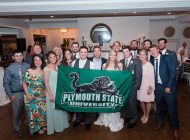A Plymouth State alumnus who majored in finance and economics, Ryan Chadwick ’00 is an entrepreneur by trade and a living example of the integrated cluster model. After starting his first solo-run business in his college years—providing ice to restaurants in the Nantucket area during the busy summer season—he realized there was always greater opportunity to make use of his resources. When the trucks weren’t delivering ice, they were used for moving furniture, transporting and installing artwork, and delivering appliances for local individuals and businesses. Chadwick had found a way to make a profit, turning idleness into action.
Next, Chadwick set his sights on an unlikely combination: restaurants, reef diving, and environmental preservation. In his free time, Chadwick enjoys diving and spearfishing in the Bahamas where, about two years ago, he noticed that the ecosystems of the reefs he frequented were rapidly declining due to an invasive species: Lionfish. Because the fish reproduce at an astronomical rate and consume up to ten times their weight in prey, Lionfish are one of the most invasive species to the reef habitats in Florida, the Caribbean, and the Gulf of Mexico. Chadwick’s knowledge of the fish came at the same time he was opening Norman’s Cay, a Caribbean-style restaurant in New York City. To save the reefs he loved, he began to hunt Lionfish and send the fish to his restaurant, where customers enjoyed the unique delicacy. Through the Lionfish Mission, Chadwick uses his restaurant dishes to educate customers about the preservation of reef ecosystems.
As customers began to rave about the delicately flavored white fish, a door opened for another business venture. Customers loved the Lionfish dishes so much that they wanted to buy the fish and cook it for themselves. Chadwick saw an opportunity to supply his customers’ demand and launched the first commercial Lionfish fishery, Norman’s Lionfish.
Chadwick continues to pursue his entrepreneurial passions in the food service industry: he currently manages Goa Taco in Manhattan and the Grey Lady restaurants located in Manhattan, Nantucket, Aspen, and Montauk. As a result of operating in upscale and seasonal locations, Chadwick finds it difficult to provide his restaurant staff with short-term, affordable housing options. To solve this ongoing problem, he is constructing eco-friendly, mobile tiny houses.
The idea came to life when Chadwick purchased two houseboats as residences for his restaurant staff during the summer season, and placed them in the port near his Grey Lady-Nantucket location. Though Chadwick solved the housing issue for one of his restaurant locations, he couldn’t bring his convenient houseboats to Aspen. He decided to design and commission the construction of a set of tiny homes that could be moved between his various restaurant locations, accommodating his business and his staff.
Instead of creating traditional lumber-and-shingle tiny houses, Chadwick’s homes will feature a fresh design based on clean-lines and constructed of a novel renewable material: hempcrete. The plant-based, eco-friendly material and seamless design of his houses makes them weather-resistant, lighter than average, and better insulated. The future hempcrete structures will utilize the power sources at campsites or trailer parks, as well as run off their own solar-generated power. The best part? The structures are completely American made.
Chadwick’s passion for innovation and his entrepreneurial spirit have allowed him to pursue an increasingly diverse career path. These characteristics are what the integrated clusters model intends to give to PSU’s students: the confidence and multitude of skills to be successful across a broad range of career ventures. ■ Kendal Lariviere ’17
 Hear more about Ryan Chadwick’s experiences as an entrepreneur, and his take on PSU’s integrated clusters model on the latest edition of Colloquy, PSU’s podcast series here.
Hear more about Ryan Chadwick’s experiences as an entrepreneur, and his take on PSU’s integrated clusters model on the latest edition of Colloquy, PSU’s podcast series here.
Tags: alumni entrepreneur faculty podcast Goa Taco Grey Lady hempcrete integrated clusters Lionfish Norman's Cay Norman's Lionfish Ryan Chadwick The Colloquy tiny house tiny houses


















